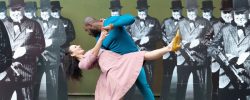 THE way in which the interwoven stories of a World War II romance and marriage, through a next generation firmly embedded in the mystique of that period and on to the present day, and a granddaughter struggling to break away from the stiflingly-traditional life imposed by her father, is reminiscent of William Burroughs’ style in his novel Naked Lunch.
THE way in which the interwoven stories of a World War II romance and marriage, through a next generation firmly embedded in the mystique of that period and on to the present day, and a granddaughter struggling to break away from the stiflingly-traditional life imposed by her father, is reminiscent of William Burroughs’ style in his novel Naked Lunch.
Burroughs said that the chapters could be read in any order – and although this show is rather more structured, it does move in and out of time zones with dazzling speed, as the three actors, with minimal costume changes, move from one character to another.
We start with Elinor Crawley getting the 1939 period beautifully – following the pre-show Glenn Miller medley played through an old wireless set – singing Every Time We Say Goodbye. She is saying goodbye to her new fighter-pilot-soon-to-be-prisoner-of-war husband Toyin Omari-Kinch. Elinor metamorphoses into her own grand-daughter and Toyin into a former school friend, now a daydreaming would-be pop star. As he tries to help Elinor prepare, once again, to be the star vocal turn at her father’s 1940s weekend, she realises how stifling her life is with a father who is hiding behind the traditions of the 1940s, viewed through rose-tinted glasses.
It takes a big emotional explosion before Toyin admits he loves Elinor more than his dream of pop stardom, and she does not want marriage to a fiance as traditional as her father. Between these events, grandfather’s unhappy return from two years in a prisoner of war camp and father’s gradual slip into the fantasy nostalgia of World War II as the disappointment with the progress of his own life becomes more apparent, are cleverly woven into the narrative.
Daniel Miller slips readily between Father and Finance, and provides an excellent portrait of Winston Churchill, in reality, where we are reminded of some of the legendary wartime leader’s less successful political moments between the wars, and his power of rhetoric in the famous ‘ “Finest Hour” speech.
There were moments when the quick-fire changes of time and place were a little muddled and some of the humour fell on deaf ears, but, set on a bare tilted stage, with virtually no costume changes, and well produced sound and lighting effects to assist, director James Yeatman’s study of three generations from wartime Britain to the present day, and how the 1939/45 World War is viewed by each of those generations, left the audience with a great deal to ponder on.
The Winston Machine is on in Bristol until 25th March.
GRP